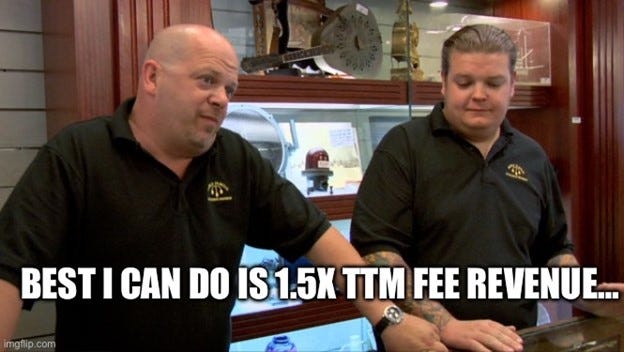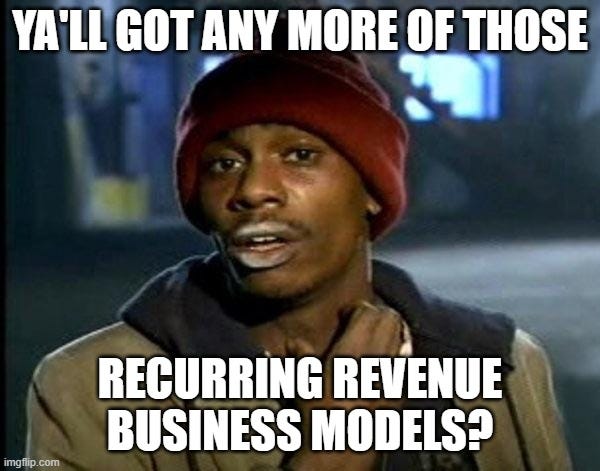On Businesses with Zero Visibility: Harris Kupperman
"I’m genuinely surprised at the bargains that exist in places where the earnings are hard to predict..."
One of my favorite investors that I love reading and following, Harris Kupperman, has offered up his thoughts on the quirks of valuations.
Harris is the founder of Praetorian Capital, a hedge fund focused on using macro trends to guide stock selection. Mr. Kupperman is also the chief adventurer at Adventures in Capitalism, a website that details his investments and travels.
Harris is one of my favorite follows and I find his opinions - especially on macro and commodities - to be extremely resourceful. I’m certain my readers will find the same. I was excited when he offered up his latest thoughts, published below.
On Businesses with Zero Visibility
As the owner of a hedge fund business (defined as a management company and incentive fees received though an affiliated entity), I’m always amazed at the returns on capital in the business. Excluding the first start-up year, the business has annually earned many times the total capital initially invested, and only requires rather minimal working capital to sustain it. As an enterprise, it has one of the best ROIC metrics of any businesses I have ever analyzed.
So, what would Wall Street pay for such an amazing business?? I’m guessing that it would be a surprisingly low multiple on earnings, and this realization led me to write this piece.
You see, despite having run this business for its fifth year now, I have zero visibility into the earnings of the business. Zero. The business basically breaks even on management fees, though we do have some flexibility in our spending. However, most of the economics are in the incentive allocation, and I have no way to predict what that incentive allocation will look like. Even worse, in some years, there will not be any incentive allocation as the fund will have negative performance. If I cannot predict results and give guidance, how can I ever expect Wall Street to value the business, as they’re one step removed from my predictive ability as the owner of the business??
If my hedge fund business were publicly traded, I feel that it would likely trade for little more than its tangible book value, or some low multiple on assets under management. Which seems like an odd valuation, as I believe that my business has a surprisingly large quantum of intangible value, hence why it has produced such strong earnings since inception. In any case, this is a somewhat long-winded way of saying that; Wall Street tends to dramatically over-value a stable and growing earnings stream, and refuses to value unpredictable earnings, even at businesses that have historically had high returns on capital.
Honestly, I find this phenomenon to be quite odd and despite over two decades of investing experience, I still cannot comprehend why this opportunity exists. As a result, I frequently discover highly undervalued businesses that are of an unusually good quality, yet the market has ignored them as they cannot model the earnings. Here’s the honest truth; not all businesses are of a SAAS nature with recurring revenues. Many businesses are just as good, or even better over rolling five-year periods, but the earnings are all over the place, frequently with periods of losses as well.
I feel that before the year 2000, investors would look at these businesses and treasure them for their high ROIC over multi-year periods, and simply ignore the quarterly volatility. However, as the time duration of most investor expectations has truncated, so too has the valuation of those companies that have become harder to model on a quarterly basis.
At my fund, we call these things “zero visibility businesses.” We don’t mean this in a pejorative sense. Instead, we mean this in the factual sense. It’s simply impossible to predict the quarterly results and as a result, we’re likely getting a bargain—frequently an unusually good bargain.
So then, how do you put a valuation on something where the numbers are all over the place? Now, this is the real challenge. To be honest, sometimes we simply cannot put a value on such a business. We can look at historical margins, or returns on capital over long periods of time, and try to back into a stabilized level of earnings for the business, but often, this exercise leaves us with a false sense of precision. Instead, we simply eyeball the thing—does the price seem too cheap for what it is?? I realize that this is highly unscientific, but by the time you get to the spreadsheet and try to model one of these businesses, you’ve already lost the narrative. I’m from the school of investing where it’s either painfully obvious that I’m getting a bargain, or it’s in the “too hard pile.”
The corollary to this practice is that I’m investing on only a slightly higher plane than many other investors who also demand a better discount in terms of valuation for something that has erratic earnings.
So then, if an entrepreneurial investor like me won’t be the one closing the gap to fair value, and most other investors refuse to even contemplate a business without quarterly visibility, what makes these companies ever re-value?? In my experience, only two things will do it. One is continuous buybacks. If one of these businesses shrinks the share-count in an aggressive manner, eventually it will re-rate as a growth stock, just because the earnings per share are growing, even if the earnings themselves are erratic. The other outcome is that a strategic or financial buyer covets the asset. This is obviously far less desirable, as the premium offered is frequently insufficient, and they effectively steal the asset from me. Long-term readers of mine know that this has been a recurring bane of mine as a value investor, but such is life.
I do think it’s worth re-examining the buyback potential of these businesses. I believe most buybacks that are executed today are wasteful of capital. They’re often done at egregious valuations and are a form of financial engineering, designed to allow insiders to monetize their stock options or to offset excessively dilutive stock-based compensation. The flip side of this, is that if you buy back your shares at a large discount to fair value, as in the case of one of these “zero visibility businesses,” and take advantage of the stupidity of the market, then you’re likely creating substantial shareholder value—especially if you continue the buyback every quarter. Many of the companies that we own are executing such a plan, and while it may not immediately lead to share price performance, I am convinced that they are spring-loading the share price for the next upswing in the business.
In summary, I’m always focused on where the opportunity is. I’m genuinely surprised at the bargains that exist in places where the earnings are hard to predict, and I suspect that this segment of the market will only become more attractive as capital continues to congregate to the few sectors that show linear growth.
As a result, you can likely guess where I’m spending my research energy.
QTR’s Disclaimer: I am an idiot and often get things wrong and lose money. I may own or transact in any names mentioned in this piece at any time without warning. Contributor posts and aggregated posts have not been fact checked and are the opinions of their authors. This is not a recommendation to buy or sell any stocks or securities, just my opinions. I often lose money on positions I trade/invest in. I may add any name mentioned in this article and sell any name mentioned in this piece at any time, without further warning. None of this is a solicitation to buy or sell securities. These positions can change immediately as soon as I publish this, with or without notice. You are on your own. Do not make decisions based on my blog. I exist on the fringe. The publisher does not guarantee the accuracy or completeness of the information provided in this page. These are not the opinions of any of my employers, partners, or associates. I did my best to be honest about my disclosures but can’t guarantee I am right; I write these posts after a couple beers sometimes. Also, I just straight up get shit wrong a lot. I mention it twice because it’s that important.
Harris’ Disclaimer: Past performance of Praetorian Capital Fund LLC and its feeder fund Praetorian Capital Offshore Ltd. (collectively, the “Funds”) is not indicative of future results. No representations or warranties of any kind are made or intended, and none should be inferred, with respect to the economic return or the tax consequences from a potential investment in the Funds. Each investor should consult their own counsel and accountant for advice concerning the various legal, tax and economic matters concerning their investment. The information provided herein does not constitute an offer to sell an interest in the Funds. Such offer can only be made to qualified investors pursuant to the Funds’ Confidential Private Placement Memorandum (“Offering Memorandum”), the Subscription Documents relating thereto and the Limited Liability Company Agreement, as applicable, which set forth the complete terms of the offer.
No representation or warranty (express or implied) is made or can be given with respect to the accuracy or completeness of the information found within this website. Certain information constitutes “forward-looking statements” about potential future results. Those results may not be achieved, due to implementation lag, other timing factors, portfolio management decision-making, economic or market conditions or other unanticipated factors. Nothing contained herein shall be relied upon as a promise or representation whether as to past or future performance or otherwise. Please read Harris’ full disclaimer here.








It's not always valid to ask how a business would be valued if it were "publicly traded." Financial businesses like this should not be valued on the basis of return on capital. The capital is the partners. You cannot buy and depreciate a human brain. For example, Goldman Sachs should have always remained a partnership. The benefit of listing as a public company is only to the partners who get a cash payday. The vast majority of the gross margin goes to compensate the operators, who are free agents, not captive capital. Let them invest your money, OK. But don't buy common stock in an asset management company, especially a leveraged one. Book value?? Means nothing in firms like this. The very proposition of listing a financial company like this is an indicator of a market top.
Thanks Raven, Kuppy is great. If I could waive a magic wand, it would be great to have him and Spiegel on a podcast.